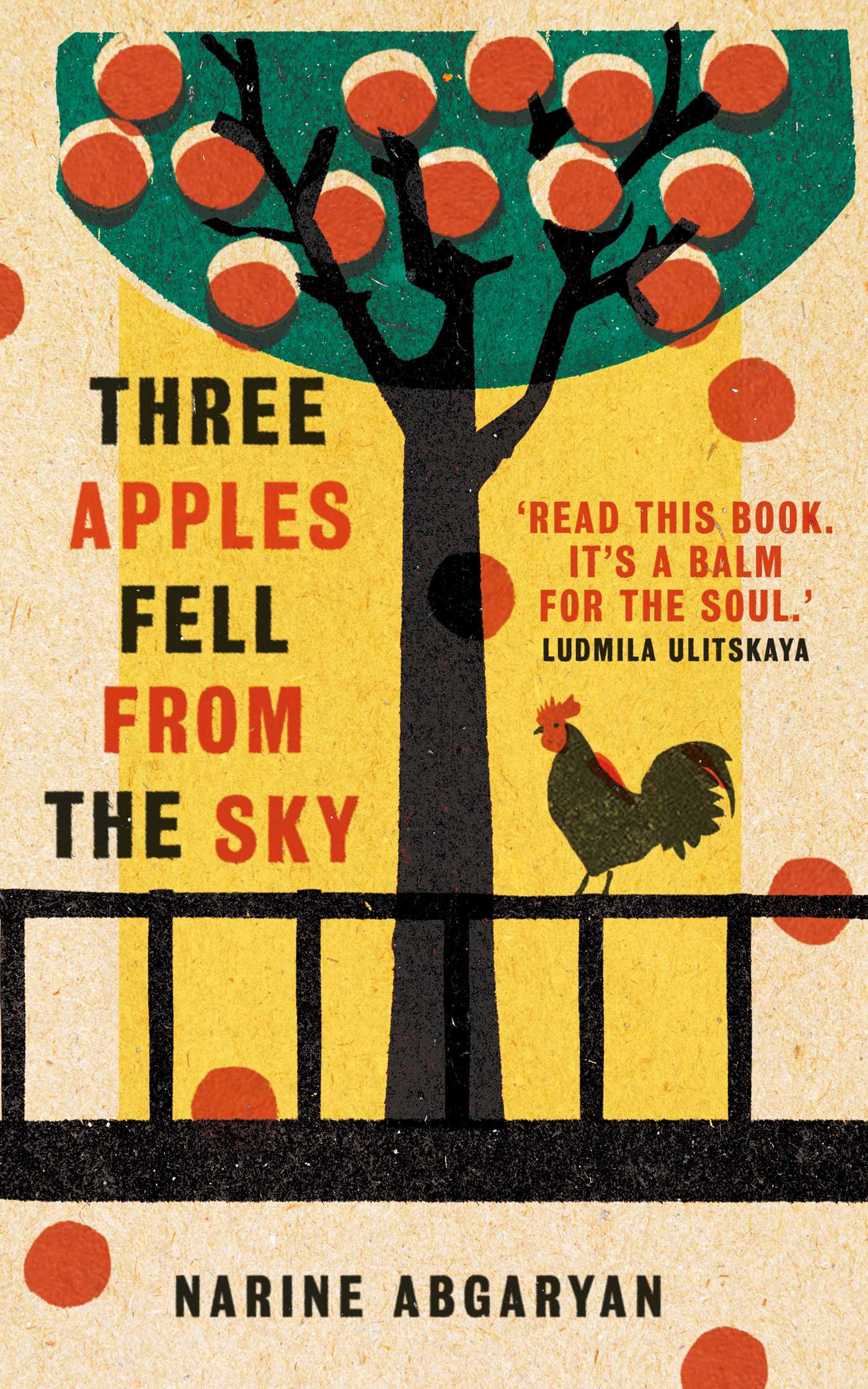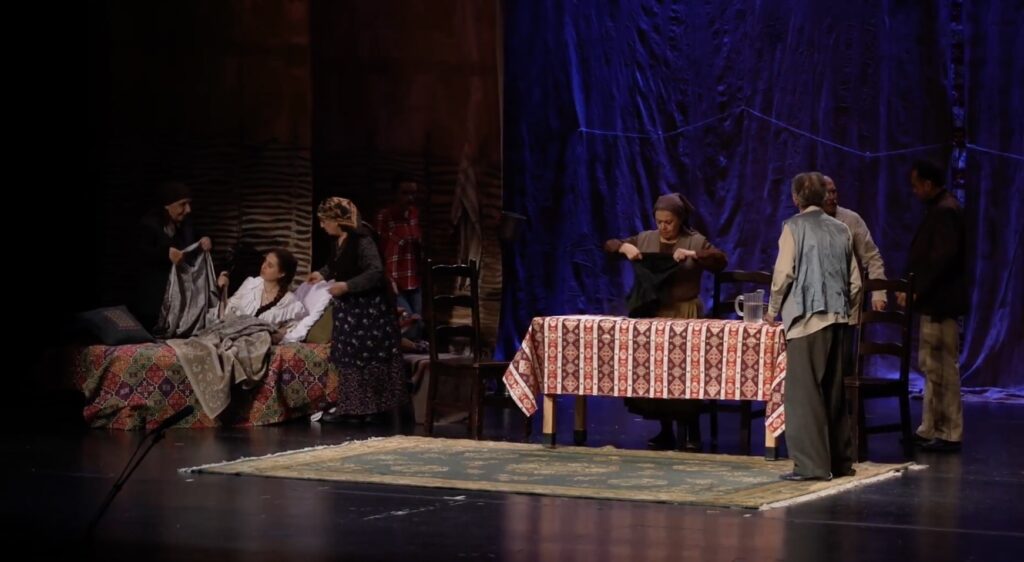MY REVIEW OF A NEW CLASSIC
Three Apples Fell from the Sky
This book gives us the chance to reconnect with the warmth of our loved ones’ souls, allowing us to make sure we don’t waste the hours given to us and live them meaningfully, close to the people who truly matter.

“Three Apples Fell from the Sky is a wonderful saga about the inhabitants of an Armenian village. But the story of this village is, in fact, a story about us. This is where Narine Abgarian’s writing talent shines. It’s a book full of tenderness and humor, subtlety, and that rare kind of mastery that feels so natural you barely notice it.” – Evgheni Vodolazkin

Introduction
Since I learned to read, I’ve always read with my heart, not just my mind. Of course, new perspectives and information have settled within me, but that was never the main goal. I’ve always loved books for how they made me feel; I empathized with the characters and lived their life stories so intensely that I always needed a few days to detach from their world and prepare to enter a new one. Sometimes, leaving a book behind — never completely — proved difficult, and that’s exactly how I felt after finishing Narine Abgarian‘s Three Apples Fell from the Sky.
“[…] And in her cool hands, she’ll cradle three apples, which, as they said in the stories of the Maranians, she’ll toss down from the sky to the earth — one for the one who saw, one for the one who told the story, and the third for the one who listened and believed in the good.”
Three Apples Fell from the Sky is a book where realism, magic, and folklore intertwine to evoke powerful emotions. Structured in three distinct parts — For the One Who Saw, For the One Who Told, and For the One Who Listened — the novel offers complete, vivid descriptions of the characters and places. Yet, the emotional impact of the story creates an almost hypnotic state, as the emotions felt so intensely give the perception that time expands. Each stage of life described doesn’t feel like an isolated episode, but rather as a life in itself, intense and deep, connecting with other lives without inducing any sense of boredom.
Detailed review
In the first section of the novel, you’ll enter the world of Anatolia, the central character, and Vasily, and discover how their lives began and the kind of relationship that binds them. The second part introduces Valinka Eibogants and her family, giving us insight into the dynamics of a family in that village. In the final part, the author brings Anatolia and Vasily back to the forefront and shows us how their complex relationship impacts the community they are part of.
“I wanted to write a book whose ending would offer hope. Humanity desperately needs hope, stories about the good.” – Narine Abgarian
The Armenian village of Maran is a place where simplicity, kindness, and hope come together to face the great challenges of life. In this place, every painful experience brings new strength, strengthens relationships, and builds something lasting. The simple routine of life is richly adorned by the authenticity of human connections, the choices characters make, and the traditions they follow religiously. The heroes of the book are storybook characters, but not rare in the rural world. Deep and full of life, they live in harmony with nature and acceptance of what fate has given them. Nature, described in detail with all its changing seasons, seems to be a distinct character in the book, while destiny is one of the three apples fallen from the sky, alongside good and evil. Time flows differently in Maran, and the elements of magic and folklore used by Narine Abgarian give the small village both a specific and universal character.
“Friday, just after noon, when the sun, having passed its zenith, ceremoniously rolled towards the edge of the valley to set, Sevoianț Anatolia lay down to die.”
This is how the book begins, with Anatolia captured in a moment of life marked by surrender. And so, the question inevitably arises in the reader’s mind: where is the hope promised by the author?
With every line you read, you will discover Anatolia’s acute need for dignity, a need that can only be fulfilled through a life lived in harmony with her principles, which are closely tied to fate, to embracing it. At this point, when reason gives up trying to control every sequence of life, hope is born. Not from the certainties of logic, but from a trust, an intuition that unexplored, unknown possibilities may represent the necessary solutions. When the heart gains this trust and peace sets in, a growing desire to move forward emerges.
Anatolia is a symbol of resilience, an emblematic image of what we would call a soul untouched by the great trials of life. She manages to follow her path no matter the obstacles she must overcome. Although she may resemble a Phoenix, she never seems to burn out. In Anatolia, there is a natural curiosity, a determination to be, that surpasses her, portraying an essential destiny that humanity could not do without.
The village of Maran also seems to be a key character, one that the author seems to want to rekindle our interest in, sowing nostalgia in our hearts. Described so beautifully that it feels utopian at times, we learn that the village’s inhabitants have gone through extremely difficult moments in life, marked by war, famine, and pain. Yet these major collective trials did not break them apart but bonded the community. Thus, the beauty and security found in this rural community become irrefutable arguments in Narine Abgarian’s plea for returning to our roots, for that’s what Three Apples Fell from the Sky represents to me. In the afterword, the author reveals this intention more clearly:
“… and here’s what I wanted to say it hurts the most that cities die the moment we leave them — for a time or forever, they lock themselves with all the bolts, fill with dust and ash, turn into illusions, into ghosts, we rush back — wandering sons and daughters — leaping and skipping, with hearts racing madly to where no one has been for a long time it took us too long to grow it took us too long to separate the wheat from the chaff it hurts the most that you can’t hug those who couldn’t wait for you anymore.”
My Conclusion
Our slow maturation steals precious time that can never be regained: time spent with our grandparents and parents, too dear to ever be forgotten by the heart. This book gives us the chance to reconnect with the warmth of our loved ones’ souls, allowing us to make sure we don’t waste the hours given to us and live them meaningfully, close to the people who truly matter.


